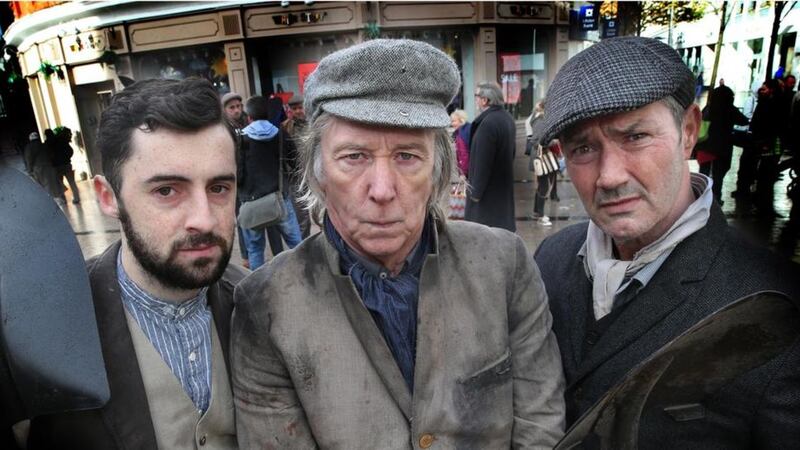THIS month 84 years ago the working-class Protestant and Catholic communities marched on the streets of Belfast over a common cause. United in their fight against poverty, more than 80,000 people staged a revolution that shook the foundations of the fledging Northern Ireland state – and won.
Two of the north's leading playwrights, Martin Lynch and Gary Mitchell, have joined forces in penning a powerful drama about the personal and community upheaval of this time.
Informed by factual accounts and research into 1932 and the events that led to the Outdoor Workers’ Relief Strike, 1932 – The People of Gallagher Street centres on the personal lives of members of two families, whose lives are turned upside down as events unfold around them.
During the protest bands from both sides of the Catholic-Protestant divide came on the march. The only neutral, non-sectarian tune both sides knew was Yes! We Have No Bananas. As the march went through the Catholic Falls and the Protestant Shankill the tune was played again and again.
I caught up with two of the lead actors, who plays the roles of father's from both sides of the political divide, during their lunch break – where no bananas were in sight.
"If I hear that banana song one more time," says Marty Maguire through gritted teeth. Maguire plays Alex Patterson, a shipyard worker and staunch unionist who initially quashes any talk of a strike.
"He believes the Protestant working class are going to be looked after by what he calls 'the big house' unionists. But as the play progresses he becomes gradually disillusioned by the fact the working class on both sides of the community are being uncared for which propels an energy amongst both communities to do something about it," the actor explains.
Rising star of the local stage Thomas Finnegan plays the more liberal-thinking Frankie McCann.
"Throughout the play Frankie becomes a figurehead, the leader of the Outdoor Relief Workers group, and he starts organising it and becoming much a more dominant and outspoken person. But at the same time as he's becoming more successful publicly, his private life with his wife is falling to pieces," reveals Finnegan, who is enjoying the challenge of playing a more mature character.
"It's the first time I've played a character that is closer to my own age," says the 25-year-old. "I'm usually playing 18-year-old but here I am playing a husband and father, with very real responsibilities. He's a quietly powerful character who only speaks when it's absolutely necessary."
In conveying this epic historical tale of social struggle for dignity in 1930’s Belfast, Green Shoot Productions have been involved in a year-long programme of community engagement including research, creative writing, community theatre and a series of public talks about 1932. And a large community cast are playing key historical characters, such as Betty Sinclair, Tommy Geehan, Dawson Bates, and Lily Coleman.
Completing the professional cast are Katie Tumelty, Gerard McCabe, Brigid Shine and Gavin Peden, who in the role of Buster accompanies the cast on banjo for songs from the time, such as Music! Music! Music! (Put Another Nickel In).
While Gallagher Street is a fabricated name to encompass both communities, Maguire hopes the play will act as a "learning tool" for audiences and also a symbol of hope on how sectarianism can be overcome.
"Hunger is hunger no matter what church you go to. These two streets which run a stone's throw from each other were able at one time to come together for the greater good and it can happen again."
This is a view echoed by Finnegan, who in the light of Brexit and plummeting exchange rates views the play as both historical and contemporary.
"It's a story everyone can relate to, even though it's a story very few know anything about. In the strike that lead to the rising, the Falls and the Shankill came together and protected each other, which has never happened before.
"I found the story really fascinating and it's something that is still relevant today because there is still a massive class discrepancy and austerity."
:: 1932 – The People of Gallagher Street will be staged at Belfast's MAC theatre from November 2-13. See Themaclive.com. Recommended for age 16-plus.



